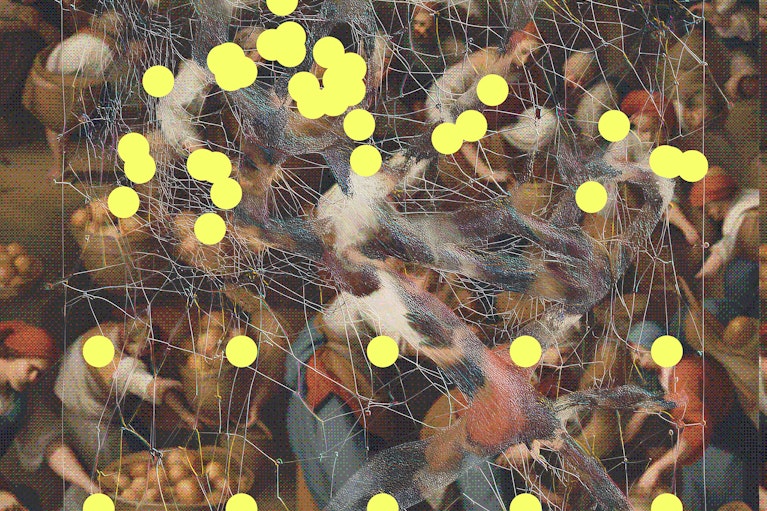One of my formative experiences as a scholar of international politics was, as a final-year high school student in Greece 20 years ago, watching “People’s Century,” an excellent documentary series by the BBC and PBS about the history of the 20th century. As the name suggests, the thread running through “People’s Century” was hopeful: Through violence, totalitarianism and death, the 20th century was presented as having advanced painfully but surely toward openness and emancipation.
It is a theme of contemporary punditry to contrast our current political and socioeconomic climate to the optimism of globalization’s heyday. But what still fascinates me about “People’s Century” is the semantic choice in the title. Studying international relations and populism, I am still amazed at how a cultural product that captured the moment of globalization’s greatest hope referenced the “people,” an entity that is today widely seen as being at the root of disruption. For “People’s Century,” both the disasters and triumphs of the 20th century had the people at their bases, a departure from previous eras when aristocratic, religious and bureaucratic elites determined the world’s fate. But at its conclusion, “People’s Century” seemed to hint at a different understanding of “people” — a global humanity participating and benefiting from an increasingly borderless world.
We now know, of course, that this optimistic idea of a transition to a global society never materialized. While economic exchanges and social, cultural and environmental trends and flows have indeed become global in scope in the last 30 years, politics has remained stubbornly anchored to settings defined by national borders and sovereignty. More and more people’s material advancement is tied to a system of intense cross-border economic exchanges that creates new opportunities for cultural exchange, travel and broadening one’s horizons. How is it possible, then, that the political reaction to these changes is one of populist frustration and retreat?
The first step in answering this question is to define what exactly we mean when we say “populism,” a problematic concept not only because the scholarly community cannot agree on how to define it, but also because populist leaders and supporters themselves are mostly unable to spell out specific programmatic positions beyond their opposition to elites. I understand populism as a mode of politics that presents political competition as an antagonistic and binary conflict between the “people” and the “system.” In this conflict, the people are virtuous and good, and the system or elites are seen as oppressive and corrupt.
Based on this understanding, populism is malleable and diffuse. It is not a priori associated with a specific ideology or program. On its own, it does not necessarily cue anti-immigrant feelings or opposition to free trade, as is often assumed in the public debate. Rather, its specific programmatic iterations reflect the conditions under which populism emerges. Populist discourses can be vastly different depending on what kind of social groups and demands a political system has frustrated or left unaddressed at a specific moment.
“In this conflict, the people are virtuous and good, and the system or elites are seen as oppressive and corrupt.”
Populism’s distinctive characteristic as a political phenomenon is that it articulates these frustrations not in terms of a programmatic response to the problems faced by specific social groups — like social-democratic parties do for the needs and demands of the working class, for example — but as a general request for political representation and recognition. Populism distills multiple social, economic and cultural demands into the political cry, “We are the people.” It sees problems and seeks solutions not in the specific circumstances that give rise to them but in the political gap separating people from their representatives.
The literature that seeks to explain the global rise of populism is of course voluminous. Without simplifying too much, we can categorize the explanations for the rise of populism that relate it to globalization in two broad streams. The first can be termed the cultural stream, which sees the rise of populist parties in Western democracies as closely related to concerns about immigration and multiculturalism. There is a substantial body of work that has linked both the Donald Trump and Brexit victories to concerns about immigration. Another stream of research, which we can term economic, focuses on the material and economic dimension of globalization. According to research down this stream, the impact of unregulated economic globalization — like the outsourcing of industries and exposure to trade, bring about significant economic displacement, which then feeds support for populists like Trump.
Both of these lines of argumentation are supported by robust research. Both, however, fail to address a question: Why do these reactions to globalization take the form of populism in the first place? After all, there is no necessary logical connection between globalization and populism. If globalization causes material and economic dislocations, why should it not give rise to socialist responses that call for more social justice, redistribution and so on? Or, if the main frustration today has to do with immigration, why should this not generate purely nationalist and nativist responses? Why does populism appear so often as an appendix to political movements of the left and right addressing new economic and cultural concerns?
The answer, I believe, has to do with the fact that these dislocations are not simply failures of economic, immigration or social policy, but expressions of a severe representational gap between the people and their political system. Political systems throughout history have always faced socioeconomic shocks that fed political reactions. In the current conjuncture, however, these shocks are of such magnitude, and are so obviously related to dynamics that escape the scope of national political power, that they appear as wholesale failures of political representation. The causal link between globalization and populism, then, is not the policy shocks that the former engenders but the sense it creates that representative systems and elites are incapable of addressing concerns of political communities in a world of economic and cultural openness.

Rather than offering concise solutions to these economic and cultural shocks, populists frame them as the expression of globalized elites’ indifference toward the needs of the political communities they are supposed to represent. This allows populists to construct identities of the people that go beyond narrow class, societal and ideological frames. In this way, a populist of the right like Trump managed to mold his anti-immigrant message with the socioeconomic concerns of the white working class, while populists of the left, like former Greek Prime Minister Alexis Tsipras and Pablo Iglesias, the leader of Spain’s far-left Unidas Podemos party, presented their fight against European Union austerity not only as a fight for economic justice but also for national sovereignty. All of them managed to cross conventional left-right barriers by molding different demands in one overarching message: that the people must reclaim representation from elites who have been absorbed in processes and institutions beyond the scrutiny of national democratic communities.
Populism cannot be pinned down on the basis of policy preferences. In the U.S., populists of the right and left have been identified with protectionism after the end of the Cold War, but protectionism is not an inescapable feature of populism historically or cross-regionally. Some American agrarian populists in the late 19th century supported free trade. Left-wing populists in Latin America are mostly protectionist, as were populist leaders of newly independent states in Africa in the 1960s and 1970s. Yet some of the most prominent populist leaders in the emerging world today support free trade as a way for their countries to harness globalization.
What unites populist trade discourses is not their policy content but the way they are being articulated. Because populism addresses social demands and dislocations by subsuming them in an overall demand that elites listen to the voice of the people, populist stances on trade are often inchoate, inconsistent or plainly inaccurate. Officials in the Trump administration and pro-Brexit activists have largely failed to produce convincing arguments to justify departure from established trade practices.
The main goals of populist projects like Trumpism and Brexit, however, are less to offer policy solutions to the problems caused by exposure to trade and more to realign their states’ policies with the demands of the communities they are supposed to represent. The key slogan of the Leave campaign in the Brexit referendum was “Take Back Control.” For the U.K., part of a deeply integrated regional economic union where various functions of national sovereignty like trade policy have been surrendered to supranational institutions in Brussels, taking back control means reclaiming the ability of the country’s elected government to strike its own trade deals.
“Populism articulates people’s frustrations as a general request for political representation.”
On the other hand, for the U.S., a global superpower that has long underpinned the open international trade system at the cost of internalizing some of its adverse effects, taking back control means abrogating on this hegemonic role and reclaiming the ability to unilaterally remedy those adverse effects on the American economy. For both Trump and Brexiteers, trade is not so much a policy that requires serious planning as an emotive term — a “signifier” — that symbolizes the representational gap between the people and the political system.
We can think of populism today as a way to rebalance the relationship between states and societies under conditions where national governments have either lost their ability to react to trends and flows of a global scope or try to regulate them in opaque and complex international institutions far removed from the scrutiny of democratic communities. Today’s world is less of a global society engaging in economic and cultural interactions across borders, as the ideal of globalization had it, and more a world of many peoples, each with the expectation from their political systems to respond to globalization according to their needs and preferences — even if contemporary policy challenges far surpass the ability of individual states to shape them.
Viewed this way, populism is a structural feature and an inescapable byproduct of globalization. Populism is prevalent today not only in Europe and the U.S. but also in Latin America, Africa, Asia and the Middle East. To some extent, this has been the unintended consequence of globalization itself, as representative democracy was established as the new normal in the international system after the fall of communism and the so-called “third wave” of democratization. The expectation in the 1990s was that, with deepening economic integration on a global scale, liberal democracy would also become the prevalent type of political regime in the world.
But the proponents of this theory forgot that liberal democracy had developed in the West when states were relatively independent and able to satisfy at least some of the demands posed to them by their constituents. A key feature in the democratization process of European states in the 19th century, for example, was their ability to integrate the demands of the growing industrial working class by developing welfare regimes. Under globalization, however, newly democratizing states did not have this discretion, not only because globalization is a much more competitive economic environment that has forced even affluent, liberal democracies to scale back their welfare provisions, but also because new democracies emerged in peripheral economies that could only benefit from globalization by keeping their labor costs low.
“Populism is a structural feature and an inescapable byproduct of globalization.”
It is no coincidence that in the global south, populism has appeared in some of the most dynamic and open emerging economies. From Thaksin Shinawatra in Thailand to Recep Tayyip Erdoğan in Turkey and Narendra Modi in India, populist leaders have tried to address the concerns of popular strata dislocated by economic modernization and integration in the global market. They have done so by emphasizing cultural and social concerns of the people — Erdoğan and Modi play on religion while Rodrigo Duterte in the Philippines emphasizes law and order — and by distributing targeted economic benefits to their constituencies, as Shinawatra did with rural communities in Thailand. In all cases, populists continued to accept economic openness and integration in the globalized economy. But they have aimed to reinstate a relationship between the people and the political system, usually mediated through a charismatic leader with a popular touch.
We can also think of populism in the West as a necessary political disruption that aims to recalibrate but does not fundamentally alter the parameters of states’ integration in the globalized system. For example, Tsipras was elected in Greece on the promise of ending Eurozone-imposed austerity but ended up implementing a harsh austerity package for four years. The populist coalition of Matteo Salvini’s Lega and Beppe Grillo’s Five Star Movement, which was in power in Italy between the summer of 2018 and fall of 2019, also promised to end austerity and even threatened to exit the euro, but its actions did not match its bluster. The E.U. worries about the creeping authoritarianism of Viktor Orbán in Hungary and Jarosław Kaczyński in Poland, yet both governments preside over growing economies and largely stay within the parameters of fiscal orthodoxy prescribed by the E.U. In Poland’s case, it is also telling that its nationalist-populist government came to power in 2015 on a strong position against refugees entering the country, yet has overseen a historic surge of immigration in order to support a booming economy.
Ultimately, the main danger from populism is not that it will tear up treaties or scale back globalization. Some political and economic disruption may indeed be caused by populism, as is the case with Trump’s trade wars. But what is more worrisome is globalization’s emerging relationship with democracy. In the 1990s, the political regime of globalization was supposed to be liberal democracy. Today, however, it appears that globalization aligns more with populist democracy. The geopolitical retreat of the West after the 2008 financial crisis has also diminished the appeal of liberal democracy in many parts of the world.
Ultimately, states must navigate an increasingly complex and competitive world while keeping an eye on restive societies at home. With a complete shutdown of a country’s relationship with the international system unfeasible and outright dictatorship delegitimized as a viable form of government (with the notable exception of China), populism may well be the only way to square conflicting international and domestic demands on political elites. Populism, of course, has many unpleasant byproducts — personalistic and authoritarian governing style, aggressive political discourses and posturing, the emasculation of independent institutions like the judiciary, arbitrary policymaking and more. However, it may continue to be the new normal in a world where the people indeed matter but in very different ways than what many expected and hoped at the height of globalization optimism two decades ago.





